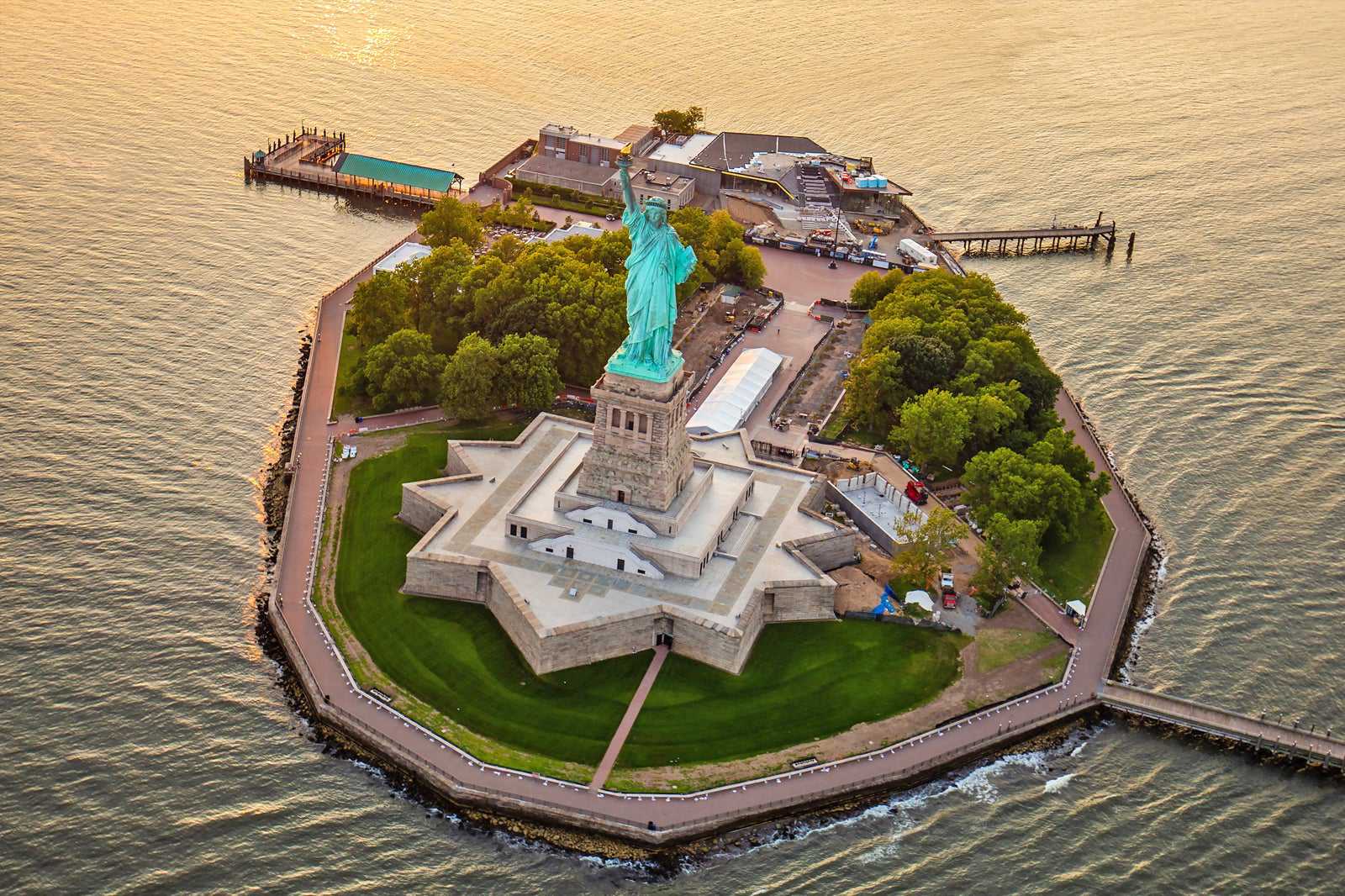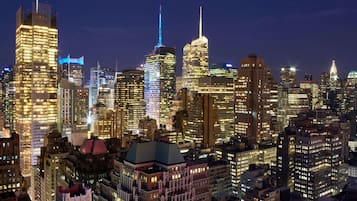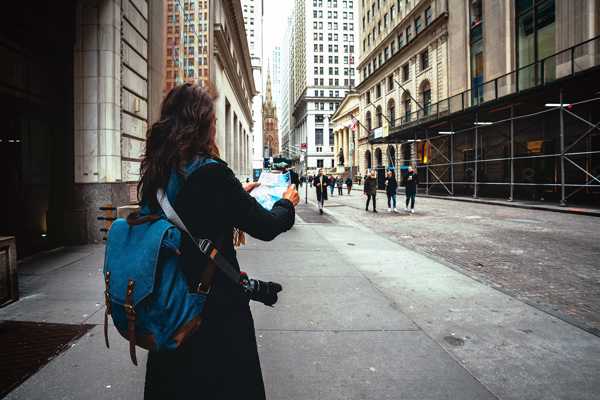The Statue of Liberty, aka Liberty Enlightening the World, is one of the most famous and beloved icons in the world. Erected in the bay of New York in 1886, it was the first thing many European immigrants saw of the USA on their arrival day.
But how well do you really know her? This stunning French lady may own an island in New York and her grandeur may be impressive, but it is the stories behind this statue that make her so interesting. From the symbols it carries to its lighthouse function to its appearance in many movies, it’s had many lives. Here are fun facts you might not have known about the Lady in the Harbor.
- 1
Her spiky crown is symbolic
It's not just a striking headdress

- Történelmi környezet
- Kép
Each of the 7 spikes on the crown of the Statue of Liberty represent the 7 oceans and the 7 continents of the world. This is said to represent the universal concept of liberty, so, it's not only about fashion. You can even visit the crown and take in the stunning vista. But in order to do that you need to climb 162 stairs as there’s no elevator service to the crown. The climb is strenuous but well worth it. The scenery from the top is simply breathtaking.
Due to its extreme popularity, there are a limited number of crown tickets per day, so book your visit well in advance.
Térkép - 2
She is actually French
And she has family in Paris

- Történelmi környezet
- Szokatlan
The Statue of Liberty was a gift of friendship from the people of France to the United States. Her head spent some time in Paris at the 1878 World's Fair before it was shipped overseas to celebrate the centenary of the American revolution.
While this magnificent statue found her new home in New York, her “little sisters” remained in Paris. There’s 1 greeting you at the Musée d’Orsay. Another one stands proudly in Luxembourg Gardens and the 3rd on the small island in the Seine, Île aux Cygnes. The 4th “sister” dominates the courtyard of the Musée des Arts et Métiers. Near Pont de l’Alma bridge, there’s a replica of the gold flame that tops the Statue of Liberty.
Térkép - 3
The statue served as a lighthouse
Shining a guiding light

- Történelmi környezet
- Szokatlan
If you were thinking she has no use and she's just a beautiful face and a big hunk of metal, think again. She actually served as a lighthouse, guiding ships and sailors home after a long trip on the ocean.
The Statue of Liberty became operational as a lighthouse on November 22, 1886, and 16 years later it was discontinued as an aid to navigation. The light ever had only 1 head keeper, Albert E. Littlefield, who lived on the island with his family.
Térkép - 4
Her head and arm are misaligned
With right bracing and support, no major "surgery" was needed

- Történelmi környezet
- Kép
In 1932, it was discovered that the head had been installed 2 ft (61 cm) off center. Also, the upheld arm was 18 inches (46 cm) away from where it was designed to be. During the conservation and restoration works in the mid-1980’s, computer aided design drawings revealed that the misalignment had caused the spikes of the crown to damage a section of the torch-bearing arm.
Luckily, the engineers were able to add new bracing and steel plates and install additional supports inside the head to improve its stability. The positions of the arm and the head remained as they had been since they were reassembled on Bedloe's Island in 1886.
Térkép - 5
Nobody is allowed in the torch
A story straight from a spy novel

- Kaland
- Történelmi környezet
In 1916, the statue suffered minor damages from the “Black Tom” explosion, detonated by German agents, and nobody has been allowed to go into the torch since. Only the National Park Service staff members, the “Keepers of the Flame,” can go up to maintain the floodlights in the balcony.
Before the tragic closure of the torch, people were allowed all the way up. There was a narrow door underneath the flame, where 12 visitors at a time could exit to the balcony. Luckily, today you can admire the view from the torch live every day with a web cam.
Térkép - 6
Lightning doesn't strike twice, does it?
Lady Liberty has to brave the elements

- Kép
- Szokatlan
The Statue of Liberty has to withstand about 600 lighting bolts every year. That’s a lot even for a huge monument made of metal and exposed to the elements. In high winds, the torch can sway about 5 inches (13 cm) side-to-side. Photographers have managed to capture lightning bolts striking the Statue, even the torch.
The Statue’s height and conductive copper make it a structure prone to lightning strikes. Luckily, a complex lightning protection system is in place. The bolts of lightning might "kiss" the copper “skin” of the Statue and leave scorch marks, but they can’t damage it severely. The Statue is safely grounded through the massive concrete and granite base she stands on.
Térkép - 7
She escaped her chains
You'll find symbolism at her feet

- Történelmi környezet
- Szokatlan
Although you can’t see them, at the statues feet there are broken shackles symbolizing the country moving forward from oppression and slavery. She is also moving her right foot towards a new, free era.
The “Father of the Statue of Liberty,” Édouard de Laboulaye was an abolitionist and together with the French sculptor Bartholdi, they envisioned a statue holding broken chains and shackles. But the early financiers that funded the project didn’t want chains on the monument, so Laboulaye and Bartholdi decided to include them at the feet of the Lady Liberty.
Térkép - 8
Why is she green?
Her robes turned from brown to green

- Történelmi környezet
- Kép
The outer surface of the Statue of Liberty is covered with hundreds of thin copper sheets which have turned green because of the oxidation of copper. Copper reacts with the air to form a patina or verdigris. Nearly all the copper in the Statue of Liberty is still the original metal, so the verdigris has been developing for over 130 years.
When the statue was unveiled in 1886, it was a shiny brown colour, like a penny. By 1906, the colour had changed to green and people in authority decided it should be painted. Eventually, these plans became public, leading to a public outcry and the plans were cancelled. That was a great decision because green really suits her.
Térkép - 9
Measurements
Tall and strong

- Történelmi környezet
- Kép
A lady never reveals her measurements, but Lady Liberty isn’t too bashful about hers. Being 151 ft (46 metres) tall, 35 ft (11 metres) across the waist, and with a size 879 shoe, she is curvaceous, voluptuous, and strong.
And she does need all that strength to hold the torch in her right hand and the tablet in her left hand. Her hands are about 16 ft (5 metres) long and her index fingers 8 ft (2.4 metres). With the base pedestal, the statue measures 305 ft (93 metres).
Térkép - 10
She's a Hollywood star, too
Can you imagine a New York film without her?

- Történelmi környezet
- Kép
The Statue of Liberty has featured in several blockbuster films, and oddly enough, many of the have been disaster films. The statue even gets destroyed in Independence Day (1996), and she’s hit by a massive storm surge and frozen in the 2004 science-fiction film The Day After Tomorrow.
On the other hand, many romantic scenes have been filmed with the statue as the backdrop. And of course, any film taking place in New York just needs to feature this iconic landmark at least once. To truly take in the beauty of the Lady Liberty, why not book a hotel with view of the Statue of Liberty, such as New York Marriott Downtown or Conrad New York Downtown?
Térkép


















